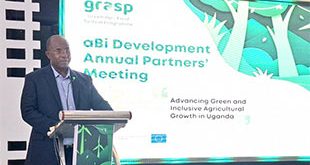
By Julius Odeke
The Japanese Government on Tuesday April 30 announced it was providing a total of US Dollars 21.2 million to four UN agencies to support their collective response to the refugee situation in South-west Uganda, as well as the critical climate-related health, nutrition, water and sanitation challenges affecting vulnerable populations in the north-eastern region of Karamoja.
The four agencies receiving the supplementary budget funds include: the United Nations Development Programme – UNDP (USD 1.0 million); the UN High Commissioner for Refugees – UNHCR (USD 4.2 million); the United Nations Children’s Fund – UNICEF (USD 8 million); and the UN World Food Programme – WFP (USD 8 million).
UNHCR says 240,000 refugees of mixed nationalities live in Uganda, of which 60 per cent or 142,300 are from the Congo. More than 60,000 of these were displaced since Jan 2012 as a result of conflict and the volatile nature of the situation in eastern Democratic Republic of Congo. The growing number of refugees has significantly strained social service delivery for both refugees and host communities in the southwest region.
The Japanese Ambassador to Uganda, H.E. Kazuo Minagawa commended the UN for its essential role in humanitarian assistance. He remarked that the Government and People of Japan are aware of the challenges facing Uganda and willing to reach out a hand to those who are in need.
“The four UN agencies are providing essential goods and services for the refugees and vulnerable people in Uganda. Given their serious humanitarian needs, the Government and People of Japan decided to contribute USD 21.2 million, one of the largest amounts of fund in the last years. I hope that with this support the UN agencies will be able to give relief to the people in hardship,” said Ambassador Minagawa.
In a related development UNHCR, which will receive USD4.2 million, will use the funding to provide protection and assistance to some 240,000 refugees and asylum seekers in 5 refugee settlements in the South and Mid-west region. The refugees originate mainly from the Democratic Republic of Congo, Rwanda, South Sudan, Somalia, and Burundi.
The programme will focus on health and education services in the refugee settlements and aims to ensure access and availability of these critical services. The programme will contribute to the Millennium Development Goals to achieve universal primary education for refugee children; reduce child mortality rates; improve of maternal health; and to combat HIV/AIDS, malaria, and other diseases amongst refugee population. The services made available with this contribution will also support the refugee hosting communities living in and around the settlements.
UNICEF will spend the USD 8 million dollars allotted to it to reach more than 30,000 refugee children and women in the South-west region and 90 per cent of all severely acutely malnourished (SAM) children in Karamoja, providing essential minimum packages of basic nutrition and health service for mothers, scaling up efforts to combat severe malnutrition and promote community engagement for health and nutrition through village health teams.
 The Independent Uganda: You get the Truth we Pay the Price
The Independent Uganda: You get the Truth we Pay the Price



